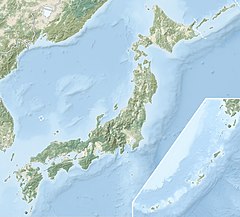Inubōsaki Lighthouse

Inubōsaki Lighthouse
|
|
|
Japan
|
|
| Location |
Cape Inubō Chōshi, Chiba Japan |
|---|---|
| Coordinates | 35°42′28.3″N 140°52′07.1″E / 35.707861°N 140.868639°ECoordinates: 35°42′28.3″N 140°52′07.1″E / 35.707861°N 140.868639°E |
| Year first constructed | November 15, 1874 |
| Construction | brick tower |
| Tower shape | cylindrical tower with balcony and lantern attached to 1-story keeper's house |
| Markings / pattern | white tower and lantern |
| Height | 31.3 metres (103 ft) |
| Focal height | 51.8 metres (170 ft) |
| Original lens | First order Fresnel |
| Intensity | 2,000,000 candela |
| Range | 19.5 nautical miles (36.1 km; 22.4 mi) |
| Characteristic | Fl W 15s |
| Admiralty number | M6478 |
| NGA number | 4780 |
| ARLHS number | JPN-171 |
| Japan number | JCG-1869 |
Inubōsaki Lighthouse (犬吠埼燈台 Inubōsaki tōdai?) is a lighthouse on Cape Inubō, in the city of Chōshi, Chiba Prefecture Japan. It is notable as one of the few lighthouses whose original lens was a first order Fresnel lens, the strongest type of Fresnel lens. It is a Registered Tangible Cultural Property of Japan. The lighthouse is located within the borders of the Suigo-Tsukuba Quasi-National Park.
Although not one of eight lighthouses to be built in Meiji period Japan under the provisions of the Anglo-Japanese Treaty of Amity and Commerce of 1858, signed by the Bakumatsu period Tokugawa Shogunate, the need for a lighthouse at Cape Inubō for the safety of vessels on the northeastern approaches to Tokyo was recognized at an early time after Japan was opened to the West. The wreck of the Tokugawa navy warship Mikaho in a typhoon on the rocks of Cape Inubō with the loss of 13 lives on October 6, 1868 further emphasized the need for a lighthouse. The lighthouse was designed and constructed by British engineer Richard Henry Brunton, who was under contract by the new Meiji government. Brunton constructed another 25 lighthouses from far northern Hokkaidō to southern Kyūshū during his career in Japan.
...
Wikipedia

